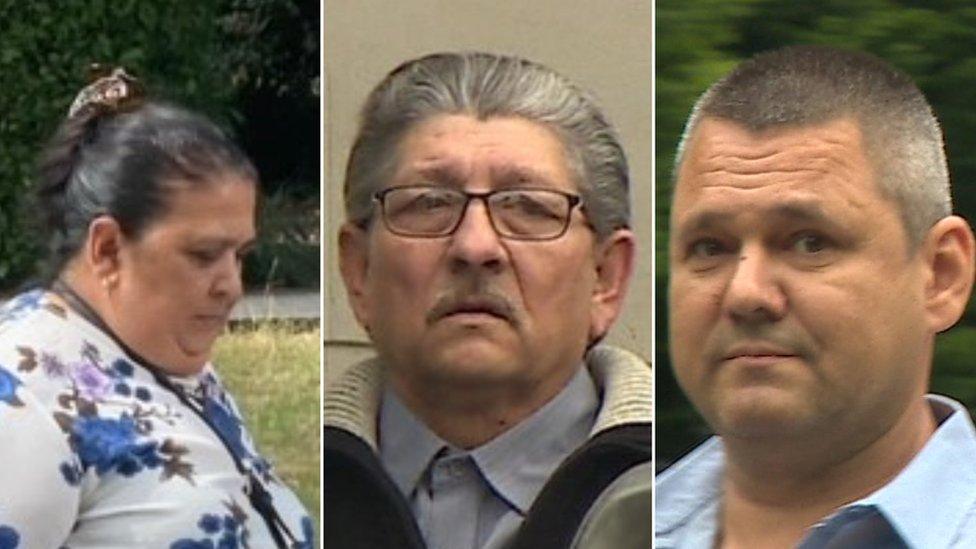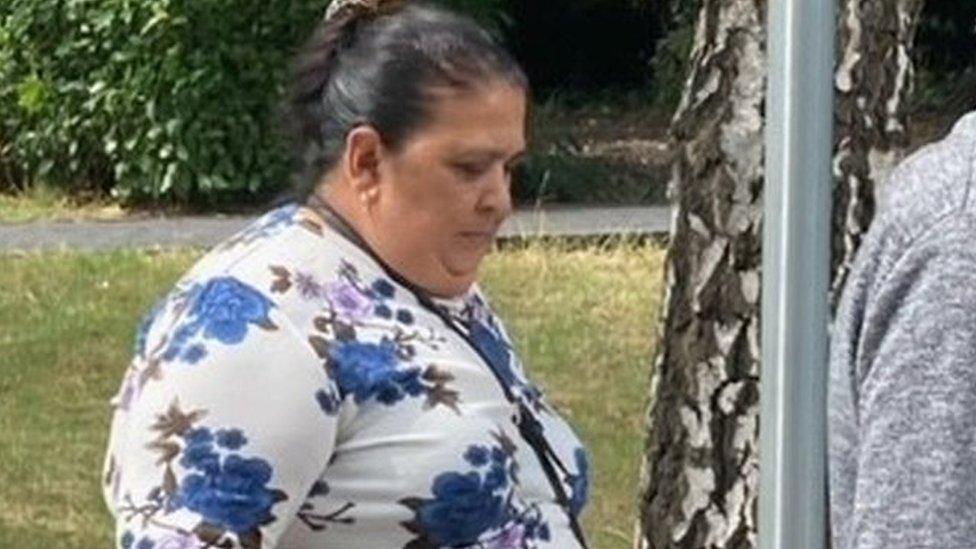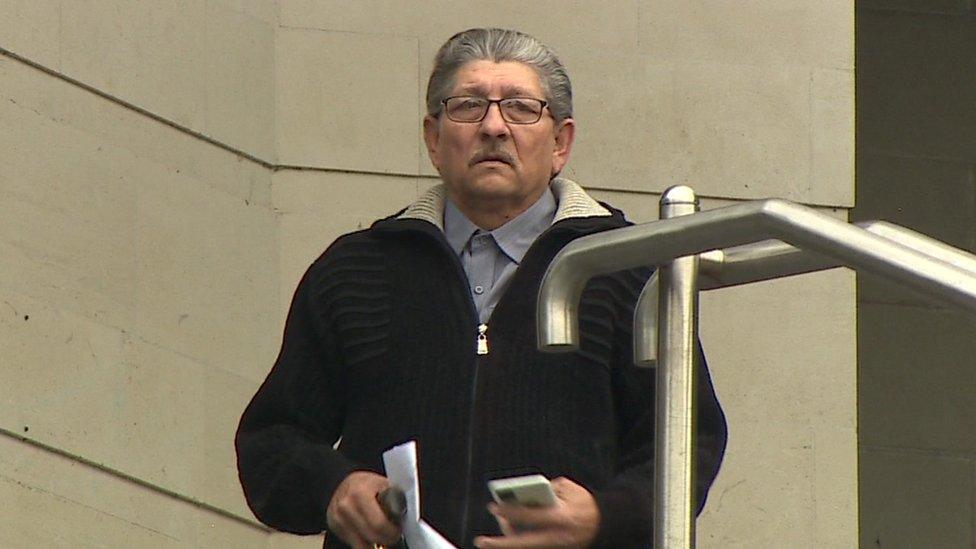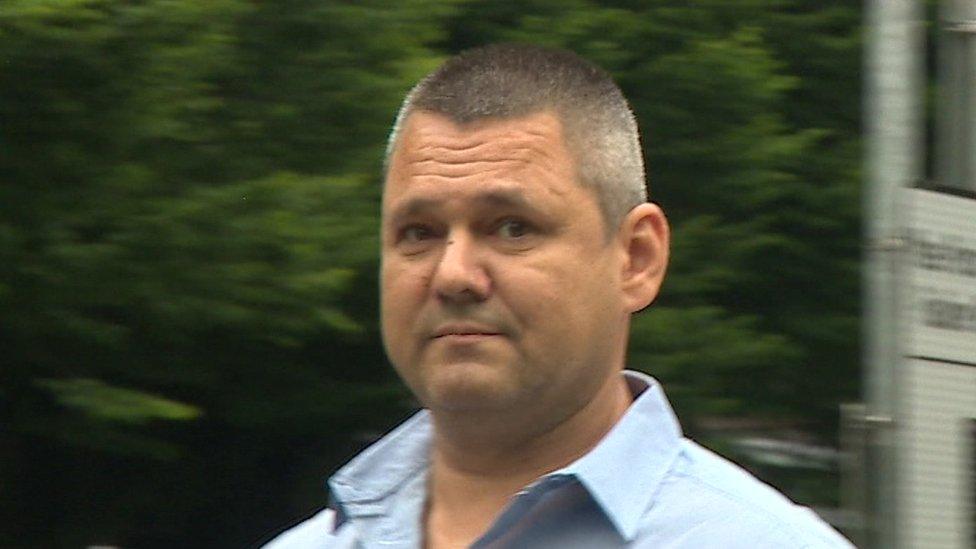Slavery: Three on trial accused of enslaving Latvian man
- Published

Ruta Stankeviciene (left), Jokubas Stankevicius (middle) and Normunds Freibergs (right) all deny modern slavery charges
A vulnerable man brought to the UK was forced to work and his wages taken from him, a court has heard.
Latvian Rolands Kazoks was allegedly stripped of his passport and bank cards and denied showers and clean clothes.
Kept in a house in Newport against his will, he was made to clean, forced into spiralling debt and told if he did not pay off the money his family in Latvia would be targeted, a jury has heard.
Two men and a woman, from Newport, deny slavery charges.
Normunds Freibergs, 40, of Morley Close, Jokubas Stankevicius, 59, and Ruta Stankeviciene, 57, both of Capel Crescent, Newport, are standing trial charged with requiring a person to perform forced or compulsory labour.

Mr Kavoz stayed in a small room in Ruta Stankeviciene (pictured) and Jokubas Stankevicius' home on Capel Crescent in Newport, the court heard
Mr Freibergs also denies arranging or facilitating the travel of another person with a view to exploitation, and acting as an unlicensed gangmaster.
Newport Crown Court heard Mr Kazoks had been living in Germany and wanted a better life in the UK.
Mr Kazoks looked for jobs on Latvian social media site Draugiem, where he was introduced to Mr Friebergs whose profile picture showed him at a desk in an office with the logo for a firm named Thomas Recruitment behind him.
That and other pictures on his account were aimed to give the impression he worked for the recruitment firm, the prosecution said, which he did not.
After being told he would be able to work in a bakery for £8.20 an hour and only pay £85 a week living costs, Mr Kazoks travelled to Wales.
He had saved £1,000 in Germany and used this to pay between €600 (£502) and €800 to Mr Freibergs, which the defendant claimed was a deposit for accommodation.

Jokubas Stankevicius kept a chart of Mr Kazoks' supposed debt on the fridge, a court heard
But, the court heard, on arrival he was told he would be living in a small room in the house of Ms Stankeviciene and Mr Stankevicius, on Capel Crescent.
Despite getting jobs in various factories, the court heard his debt to the three defendants spiralled as they erroneously charged him for things such as £50 for a National Insurance number, and £300 for getting a job in a chicken factory.
While unemployed, Mr Kazoks' debt soared and the defendants added interest.
The court heard they increased his living costs to £95 to pay for internet and to £150 because of Brexit.
Mr Stankevicius was said to keep a chart of Mr Kazoks' supposed debt on the fridge, which ran into thousands of pounds.
Lowri Wynn-Morgan, prosecuting, said: "Mr Kazoks will say that whilst living at the Capel Crescent address he was threatened by Mr Freibergs and Mr Stankevicius.
"They told him, in effect, that if he said anything or left without paying his debt he would be in trouble and his family would suffer.
"They told him that bad people in Latvia would force his family to pay the money, and that Mr Stankevicius had been to prison and knew other criminals.
"The prosecution's case is that these threats were designed to force Mr Kazoks to work by intimidation, to live in poor conditions and hand over the majority of his wages to the defendants."
The trio are alleged to have taken control of Mr Kazoks' payslips, work email and opened bank accounts in his name.
They gave him small amounts of money.

Normunds Freibergs denied arranging the travel of a person with a view to exploitation
Ms Wynn-Morgan said that if he asked for money, he was told he could buy what he wanted when his debts were cleared.
It is alleged the three took about £10,000 of Mr Kazoks' wages in total.
But when he began working at Abergavenny's Faccenda Foods in December 2017, colleagues noticed how little food he had, and that he kept wearing the same clothes.
A collection was held for him to buy trainers after he turned up in winter wearing sandals.
Some said they shared food with him after they noticed him watching them eat.
In October 2018, the court heard, he went with a colleague to the company's HR department and said he was "ready to talk".
The Gangmasters and Labour Abuse Authority and police were called and the three defendants were arrested.
All three denied the allegations and claimed to have "felt sorry" for the victim and helped him gain employment.
When asked about the £10,000, Ms Stankeviciene said she believed Mr Kazoks had used it to "send money to his mum, and also buy nice clothes and nice food".
Ms Wynn-Morgan said: "Mr Freibergs recruited Mr Kazoks to come to the UK in order for him to be exploited."
She said Mr Freibergs knew "Mr Kazoks would be placed with accomplices Mr Stankevicius and Mrs Stankeviciene, his wages pilfered, and that he would be threatened and kept in miserable conditions and required to work to pay off contrived debts".
The case continues.